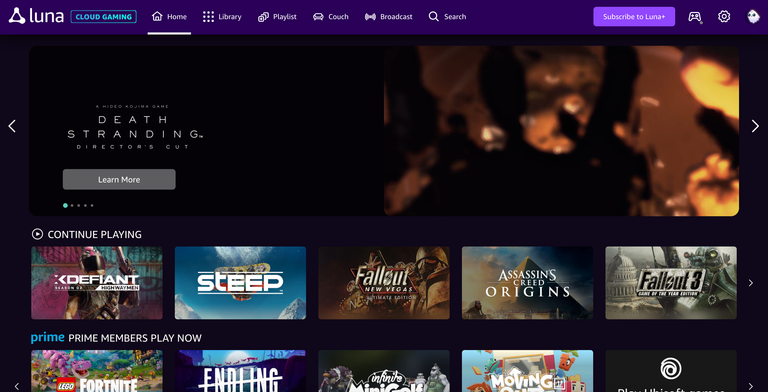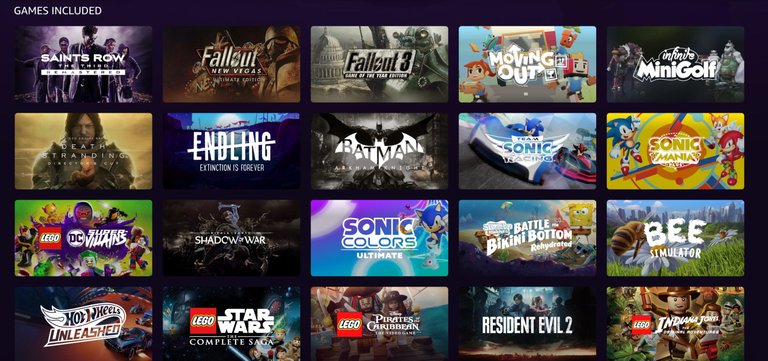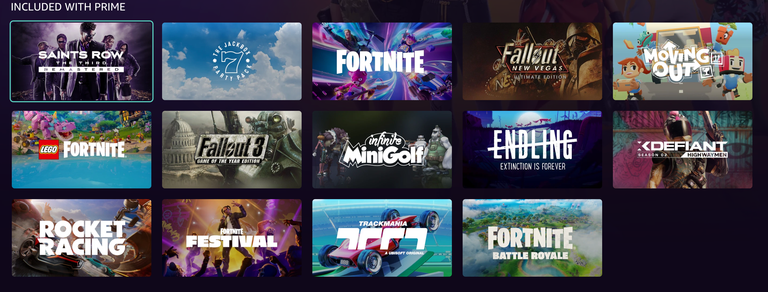
I have never liked the idea of cloud gaming. On paper it seems like a technology that seems useful: pay someone to host the game on a machine that can run it, and stream the game to a device that wouldn't be able to run it elsewhere. As someone that has been relying on a Macbook Pro and had to wave goodbye to my gaming PC back in England over a year ago, I have been really missing playing games, especially the ones that are a bit more power hungry and love to eat up electricity and have a thirst for hardware strength. Armored Core 6 was devouring my time upon its release. And for a long time I was loving playing through Red Dead Redemption 2. For the past few years, cloud gaming has been something the industry has been trying to push as the industry grows a bit more reliant on digital releases. Steam dominates the PC market, Epic is attempting to eat up some of that market share and failing, while Xbox has been slowly trying to weave cloud gaming into its higher tiers of Xbox Game Pass. Even Google attempted to jump into this wave of cloud gaming by releasing a console specifically aimed at streaming games to it: Stadia. To no surprise, much of these products have been rejected from the market.
This consumer rejection comes from multiple places that seems completely reasonable when it comes to trying to ask a person to pay monthly to access something. Ownership is something gamers tend to thoroughly enjoy, and while the decline of the physical disc has been evident with the rise of Steam and the convenience of digital media, consumers still feel that their digital purchases are something that belong to them under an account that they can access at any moment. While there isn't full truth to this, the sense of ownership keeps consumers away from the more unfortunate realisation of renting. Want to purchase a game? It's a fixed amount of money that you can pay right there or wait for sales so that the price may decrease. With cloud gaming you're paying a fee each month to access numerous games that you might not even like. Xbox Game Pass relies on offering a wide range of new and old releases to the consumer, and the cloud gaming side of things isn't present unless it's something you want to pay for. Some find a great deal in this, while many consumers still prefer to just throw money at the games they want specifically. This isn't to mention the idea of renting anything being something that the general public holds a more stern look to.

And with the consumer mentality of renting and ownership aside, there's the problem of quality that arises with streaming something across the Internet. More serious consumers in the gaming industry have quality in mind and are more than happy to throw a fair dollar or two towards obtaining that higher end quality. In the era of fast-paced multiplayer games, massive file sizes for games, and the ability to play them at 60 frames per second at 4K resolutions, having the offer to stream a game to their machines at a 1080-at-best resolution just doesn't cut it, especially when the idea of latency comes into play. If you haven't yet made the connection, this means that a massive majority of the video game consumer market has already been alienated from the whole idea of cloud gaming. The target demographic isn't for the average person with high end specifications and the convenience of storage. Cloud gaming is also facing a huge kick in the groin from another area of the gaming industry: portable devices. These devices have made accessing these existing libraries and storefronts significantly easier in recent years. The Steam Deck is a huge hit, and many are awaiting Nintendo's next upgrade to the Switch. A little lower in the market are the plethora of smaller companies attempting market share.
So what purpose does cloud gaming even serve anymore? I mentioned previously that I have been travelling for a year now. I have a Macbook Pro to which everyone is aware of how atrocious these things are for attempting to play anything on them. Either there is no support for the hardware, or the hardware just isn't up to standards for playing the more intensive games. I feel that itch to play things often, and it's something I've greatly been missing. To add to this, I'm now in a nation where consumer protection is a joke and I'd be a fool to consider purchasing something technological and somewhat expensive from any retailer here. While some of this may seem obvious, I feel like it's important to take a look at the product and try to understand who it might be for, where it sits in the market and whether it is actually trying to solve a problem for someone out there. And to some degree, I can see it. While that problem is minor and easily fixed with other options, cloud gaming seems like an answer to a problem that most won't face.

So, to some degree I am currently what companies would consider the more ideal target audience for a cloud gaming service, right? I have a machine that's relatively weak, limited storage, and I don't have easy access to something a bit more serious. But I still have that itch to boot something up for a bit and dive in. I noticed, as someone that is subscribed to Amazon Prime, that I have a very thin free access to Amazon's own cloud gaming service named Amazon Luna. I had seen them advertise this to me quite often, especially if you ever open up Twitch to which Amazon owns. I got curious as to what the service offered, how it worked, and how good it actually was. Now, there's a major aspect of all of these scenarios aforementioned that I failed to write about: Internet speed. While it's the one thing that most of us have decent access to, cloud gaming is incredibly demanding on the bandwidth side of things. Somewhat counter intuitive when we consider the other problems of not having access to the more powerful options to play things. I think I have fairly decent Internet speed here in Tbilisi, but one would assume, especially for a more realistic case, that the person doesn't have a wired connection. That already increases latency and offers lower speeds when relying on a wireless network. To no surprise, Amazon directly suggests that one should in fact use an Ethernet cable for better results. It is also worth noting that if you pay the monthly subscription to Luna, the game library is still quite thin and not all that enticing. Most being lower budget indies with a few decent titles sprinkled in there somewhere.
Considering the more realistic option to which a person might want to use a cloud gaming service, I used my wireless connection from a Macbook Pro M2 with 16GB of RAM. The application isn't available on MACOS, so that meant streaming directly in the browser was the option. The Amazon Prime library is thin, a handful of games but you can connect a few other launchers and get access to a spoonful of games you already own with Ubisoft, Epic Games, and GOG. I did find that feature quite nice, the idea that you can connect existing launchers and access some games you already own and stream them through Luna. But this was a relatively thin collection of games that I have on those launchers; and Amazon Prime's Luna has about twelve free games unless you subscribe directly to Luna itself. I decided to give a few of these games a chance, primarily focusing on single player experiences that were both dated and newer with more demanding specifications. Starting with Fallout New Vegas, I encountered latency problems quite quickly. A lot of lagging around as the game would have to catch up. Though I was surprised at how fluid it still felt at times.

The latency issues would certainly get annoying in encounters in which your'e really needing things to remain stable. After all, Fallout is a game where you're entering buildings riddled with enemies, finding cover and popping out of it with all sorts of enemies both running directly at you and firing various weapons at you. Latency issues and a loss of resolution are precisely what you'd want to avoid. I think that for smaller, slower games the latency wouldn't be so much of a problem, games featured like Stardew Valley, where much of the time you aren't heavily racing to do things against fast-moving opponents that pose a genuine threat to your character. This was most evident when I tried to boot up Ubisoft's recent FPS XDefiant, which ran like a total disaster due to these problems. Anything multiplayer and against other actual people and you're definitely at a significant disadvantage. So to some degree I can say that there are games that work here, and some that definitely don't. I think that in this era, and with the monthly subscription that's often around the $12+ mark, you're still better off paying up a little more all at once and getting yourself a handheld device.
To skip the Internet and latency problems, but also have constant access to a library that isn't ever going to end up in and out of rotation as you're playing. I can't image getting into a game like Fallout and then the platform announces it leaves in thirty days. As well as more support for the types of games you want to play and enjoy. My experience wasn't truly terrible, and there's definitely some audience here for this sort of thing, but I'm not that audience after all. But for something that ran in the browser, the idea is impressive. I just fail to see it as something more than an idea, a glorified tech demo, in a way. I also don't think the service is offering a fair set of features for the pricing. The platform has a decent amount of support for other launchers which is nice to see, but the offerings from Luna itself are weak. And that's something to be expected with so much competition each with their own services.
Well, I have no problems with the latency since I don't like Online Mode games. So I usually play Solo Games and in that case, the latency is not a big worry.
What I don't like in these systems is that you only get a few months to play each title before they take it out from the catalogue and replace it with another game...
Yep, that's the main thing I thought of that makes a lot of these services disappointing. The single player side of things didn't bother me much, a few hiccups here and there aren't much different to regular frame drops that might take place on a desktop. It's really impressive that you can play these games through a browser though.
I admit I had to do a double take when I saw a post of yours here (hello there :D) - I also had seen DanDaDan's first six episodes recently (nice surprise too)
The title did catch me well - cloud gaming services honestly are often an "O don't think so for me" because of that latency + internet speed reliance.
I can't ever think that playing with big delay is good when most of my games of preference require action and reaction (and if there's ANY reason I would stomach it, would either be to fool around with friends long gone into far away places through Parsec, or if a game I want to play online requires my inputs to be delayed due to server/player distance), so I've always seen these things as some sort of fad.
It could work in the very specific perfect conditions the creators seem to expect (high speed internet/wifi plus the servers not taking a hit whenever you try), but honestly that idea sounds something out of Japan - not in a bad sense...but in the sense that Japan (I think) may have the structure for high speed internet everywhere to have such idea work consistently.
My only hunch for that is knowing that Japan is full of modern arcade games that support national online between arcade cabinets - so that would have to be pretty fast to work swimmingly on all cabinets across the country.
But anywhere else it seems like a pipe dream more than anything that it works perfectly each time because of course things aren't as simple.
Thanks for your fresh impression on this one - I had a sudden memory to Samurai Showdown (the last one) being exclusive to Stadia users if you wanted to play it on PC for a while... definitely wouldn't have hurt that game's long time health if they had just offered a normal PC port instead or along that Stadia version rather than waiting until it died to do so.
On one last curious note... isn't it crazy that the phones we have now can emulate a ton of things portable consoles and phones from a decade ago could only dream of? DS and PSP emulators on a phone would have been crazy when they were fresh, but now they are hands down one of the easiest things to run on it.
Hope you had a great day :)
Hmmmm yeah I didn't even know something like this existed.... it sounds like a great idea but I don't think I'll ever use it .. I'd much rather be playing a game on my own rig even if my own rig is as crap as crap....
What about latency and all that? There must be some uncomfort?
I really noticed the latency problems when it came to faster games. Anything multiplayer and you're definitely getting a disadvantage. Especially on the FPS side of things. But for single player stuff, it felt rather responsive for the most part. Even in Fallout where once you're in those battles and there are a few people running around, it didn't feel like there was a big difference between the inputs I made and the actions.
I do think the tech behind it is impressive, it's something that is cool to see, just it solves no problems for anyone really. You are just better getting your own desktop or paying the upfront cost of a handled like a Steam Deck or Switch. Especially given their lower prices between $300 and $600.
The main problem isn't even a technical one for me, the thing I hate is the idea of game rotation. Imagine getting into a game like Fallout and then the cloud service tells you they're removing it in a week or two.
I think this tech also shows that the people that create it and push it don't really understand the mentality of the consumer. The consumer wants ownership, and the best quality they can get. And they are in fact willing to pay for that.
For as long as I've been hearing about 'playing in the cloud', it's never really caught my attention. Maybe because although my internet is not terrible, I wouldn't dare to say that it's great, and although I've seen some times that the systems say that it's not necessary to have “so much speed”, the reality is that it is, at least to have a more or less decent experience.
Anyway, even if I had a nasa internet, I don't like the delay that is usually there, as you mention. This is why I have always believed that the technology of playing in the cloud is just something new and amazing, but when it comes down to it, the audience that will really see its usefulness is very specific. Besides, I think it still needs to evolve a little bit and improve, but I don't know if that will be possible.
I like this phrase, for me it totally defines the situation.
Yeah I don't see it replacing anything in the future. It will just exist in some form, until it doesn't. I don't think there will be a major breakthrough. There's more money in selling overpriced licenses to a game than having everyone pay a monthly subscription to get access to everything. Microsoft's Game Pass is a great example of how even that idea has failed to be profitable. They've had to rip that idea up into pieces and change it so massively that it now even has different tiers to it.
Nothing can replace game ownership and hardware.